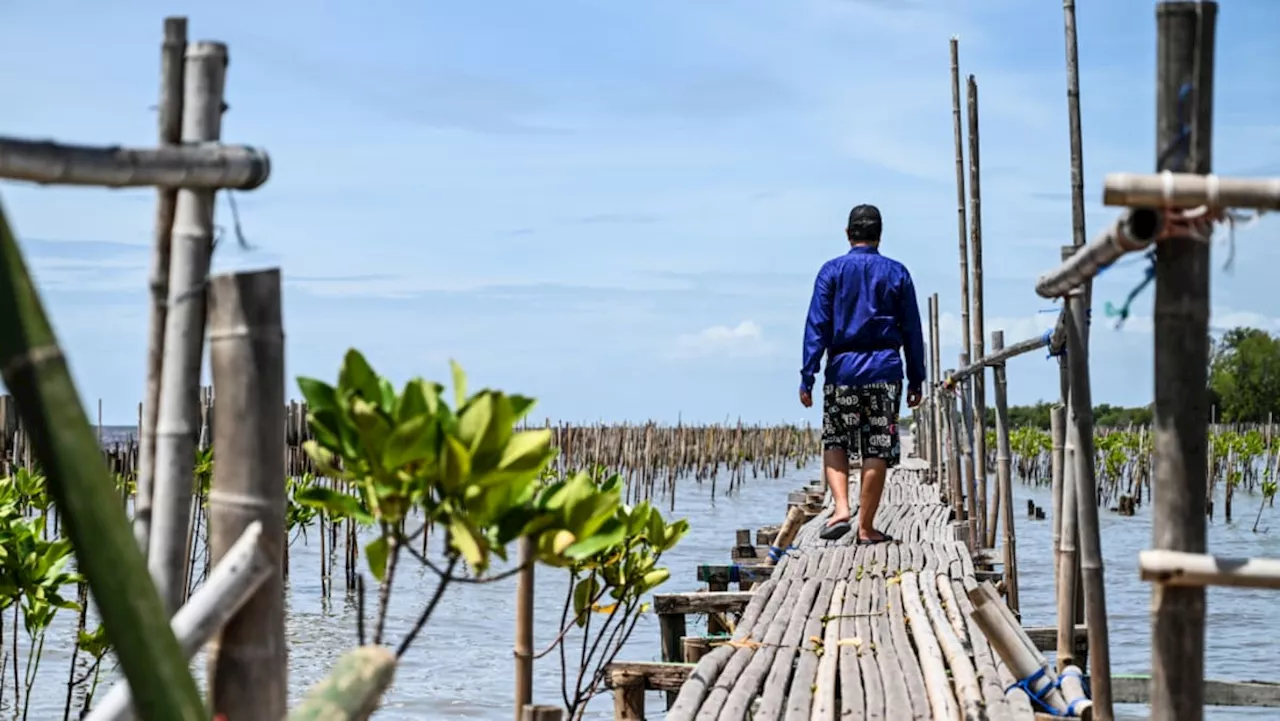Giant sea walls, artificial islands and underground tunnels - these are some solutions being floated in Jakarta, Bangkok and Kuala Lumpur to combat flooding or sinking land. But experts say nature-based options may work better.
A walkway surrounded by makeshift coastal defence barriers in the form of bamboo fence put up by villagers at Bang Khun Thian in Bangkok to fight rising sea levels. BANGKOK / JAKARTA / KUALA LUMPUR : Standing at the shoreline of the Gulf of Thailand, murky waves rippling at makeshift coastal defence barriers, is to be a witness to a creeping calamity.
The community at Bang Khun Thian is a watchdog at the gates of the Gulf of Thailand, forebearers to the flooding that experts fear will increasingly threaten Bangkok, the megapolis visible on the horizon and that stretches deep inland. “We have been living here since olden days. But things have changed from the past,” said Mr Suthee Changcharoen, the head of the Bang Khun Thian community.“We then need to retreat and retreat. Us villagers don’t have wealth to fight against the sea. We flee because we cannot fight,” he told CNA.
What is at stake is the lives of millions living on land that could conceivably be underwater, the productivity of critical economies and the potential collapse of vital urban infrastructure and natural ecosystems alike.Or if nature itself can be managed instead - or at the same time - to bring equilibrium back to places where human development has run wild.There is a big idea in the Gulf of Thailand to literally construct an answer to Bangkok’s flooding dilemma.
“The first benefit is that it can reduce coastal erosion because we build it in the sea, right? Secondly, we don’t need to take land back and there’s no impact during the construction, which will take over 10 years because humongous structures will be built.” A report by Greenpeace in 2021 found that more than 96 per cent of Bangkok's land area could be affected by flooding during a once-a -decade flood event.million residents of the city and gross domestic product of US$512 billion would be threatened. Thailand's 2023 GDP stands at US$514.94 billion while Bangkok has an estimated population of 11.2 million people.
It is also considering a flood defence barrier that would function similarly to one in the Thames River, which protects London from tidal surges.problem in the future is when sea water levels rise, water in the Chao Phraya river will rise higher as well,” Bangkok governor Chadchart Sittipunt told Thai media last month.
It has started to implement its “Chao Phraya 9 Plans”, which includes water management investments with an estimated cost of US$9.4 billion. That includes hydraulic infrastructure and expanding water storage capacity. “This speaks to a realisation of people who say, wow, we cannot afford those kinds of events,” he told a panel discussion this month, noting that Thailand only spent 0.04 per cent of GDP on such flood controls.
During full and new moons when the tides are at their peak or during the monsoon season when the seas are rough, she barely sleeps at all.A man fishes while sitting on a retainer wall meant to keep the sea from inundating the Jakarta neighbourhood of Muara Baru behind it. Over the past 50 years, Jakarta has been sinking at a rate of up to 25 cm per year, particularly in the coastal areas like Muara Baru, which lie on loose and unconsolidated soil and sediment.
The plan, first proposed in 2014, promised to serve as a permanent solution to Jakarta’s land subsidence as well as rising sea level brought by climate change. The plan was later shelved because of a lack of investment as well as criticisms that it could damage Jakarta’s delicate mangrove ecosystem – which requires a mixture of fresh and saltwater – and make it harder for fishermen to sail out of Jakarta Bay and catch fish in the Java Sea.
“Finding new sources of clean water and expanding the municipal water network will be much more effective and cheaper than building a giant sea wall,” he told CNA, adding that as Jakarta’s population grows by around 100,000 every year, the city will need more drinking water.Because parts of Jakarta, Indonesia are already below sea level, water had nowhere to go, turning neighbourhoods into swampy wastelands.
Dr Heri, an expert on geodesy – the study of how the Earth’s geometry changes over time – said it is hard to get people to understand the consequences of extracting groundwater because land subsidence happens gradually over a long period of time. Illegal squatters along Jakarta's Ciliwung River have narrowed the city's main waterway, causing Jakarta to become more prone to floods. “Jakarta has too much water during the rainy season but not enough during the dry season,”To mitigate this, Jakarta needs more places to store water such as open green spaces and reservoirs.
But Dr Yayat of Trisakti University said this is hard, because each government has its own priorities and interests. Whenever Mr Muarif Matrawi observes black skies in the horizon from his home in Kampung Chubadak in Kuala Lumpur, he gets worried.In the past one and half years, he has seen his one-storey home been inundated by flood waters twice, the first time resulting in him having to get rid of his belongings such as mattresses and some electrical devices.
Authorities and experts say that changing weather patterns have resulted in the country experiencing more frequent and heavier rainfall events in recent years as existing infrastructure is not able to cope with the deluge of rain. She added that deepening work at the nine detention ponds is being carried out, along with the upgrading of roadside drainage systems.
The 9.7km tunnel, which cost about RM1.9 billion to construct, runs from the southern part of Kuala Lumpur to the city centre.When it rains heavily, the SMART system can divert large volumes of flood water via two holding ponds, a bypass tunnel and a storage reservoir. He said that the rapid pace of urbanisation has caused green areas to be paved over, with the ability of the land to absorb rainfall drastically reduced.
She said that the sinkhole that swallowed up a tourist in Masjid India was likely to be caused by improper planning. In Thailand, as the Pearl Necklace concept emerged from the depths and onto the desks of decision makers, a debate has been further ignited about the role of nature as a complement - or even a substitution - to those works.to design and implement visionary water management projects in the city, says the co-benefits that nature provides for cities are often overlooked.
“The city actually is on top of this natural dynamic. And when we’re not putting nature at the centre and we only think about human-centric development, we are losing the balance of how the city can be resilient and how it can be sustained,” she said. “Instead of a giant sea wall, why not build a giant wall of mangroves?” he told CNA, arguing that reforesting the coastal areas will not only be a more ecological friendly solution but be economically beneficial.Mr Nirwono Joga, executive director of Jakarta-based think-tank Centre for Urban Studies.
“The Sponge City is a city with a water system that is highly adaptable to environmental changes and natural disasters that acts like a sponge, absorbing, storing, infiltrating, cleaning and purifying rainwater before releasing it for reuse.” Mr Nirwono in Indonesia said Jakarta’s issues require multiple ministries and local governments at various levels to work together.
The council is tasked with coming up with a blueprint to solve problems such as transportation, flooding, spatial planning and environmental degradation in Jakarta and its suburbs, and coordinate its implementation with related ministries, provinces, cities and regencies.
“It's very necessary to coordinate this. We can invest together. We can share together and we can prepare better together,” he told a panel event in Bangkok this month. In her years living here, Mdm Fatimah has had to move houses twice because the Jakarta government needed her land: First to build a retainer wall in 2009 and later a pumping station in 2014.
South Africa Latest News, South Africa Headlines
Similar News:You can also read news stories similar to this one that we have collected from other news sources.
 Water utility American Water disconnects computers following 'cybersecurity incident'U.S. water and sewage utility American Water said it has paused billing, yanked its customer service, and disconnected some of its computers following an unspecified "cybersecurity incident.
Water utility American Water disconnects computers following 'cybersecurity incident'U.S. water and sewage utility American Water said it has paused billing, yanked its customer service, and disconnected some of its computers following an unspecified "cybersecurity incident.
Read more »
 Southeast Asia Outpaces US Markets Amidst Federal Reserve AnticipationSoutheast Asian markets have surged past their American counterparts since late June due to rising expectations of a Federal Reserve policy shift. This has weakened the dollar and strengthened Southeast Asian currencies. The region is projected to surpass the United States in GDP growth for both this year and next.
Southeast Asia Outpaces US Markets Amidst Federal Reserve AnticipationSoutheast Asian markets have surged past their American counterparts since late June due to rising expectations of a Federal Reserve policy shift. This has weakened the dollar and strengthened Southeast Asian currencies. The region is projected to surpass the United States in GDP growth for both this year and next.
Read more »
 Criminal networks in Southeast Asia flourish in Telegram’s ‘underground markets’, UN saysThe app has enabled a change in how organised crime can conduct large-scale illicit activity.
Criminal networks in Southeast Asia flourish in Telegram’s ‘underground markets’, UN saysThe app has enabled a change in how organised crime can conduct large-scale illicit activity.
Read more »
 WHO Urges Southeast Asian Countries to Prioritize Adolescent HealthThe World Health Organisation (WHO) is calling on Southeast Asian nations to focus on the unique health needs of adolescents. WHO Southeast Asia regional director Saima Wazed emphasized the importance of investing in adolescent health, highlighting its benefits for individuals, societies, and future generations.
WHO Urges Southeast Asian Countries to Prioritize Adolescent HealthThe World Health Organisation (WHO) is calling on Southeast Asian nations to focus on the unique health needs of adolescents. WHO Southeast Asia regional director Saima Wazed emphasized the importance of investing in adolescent health, highlighting its benefits for individuals, societies, and future generations.
Read more »
 Telegram app hosts 'underground markets' for Southeast Asian crime gangs, UN saysBANGKOK — Powerful criminal networks in Southeast Asia extensively use the messaging app Telegram which has enabled a fundamental change in the way organised crime can conduct large-scale illicit activity, the United Nations said in a report on Monday (Oct 7).
Telegram app hosts 'underground markets' for Southeast Asian crime gangs, UN saysBANGKOK — Powerful criminal networks in Southeast Asia extensively use the messaging app Telegram which has enabled a fundamental change in the way organised crime can conduct large-scale illicit activity, the United Nations said in a report on Monday (Oct 7).
Read more »
 Commentary: A Trump win may raise risks of inflation and growth slowdown for Southeast AsiaDonald Trump advocates for escalating tariffs while Kamala Harris’ proposals are more targeted. Either US presidential candidate will need to grapple with the country’s ballooning debt, says UOB’s Heng Koon How.
Commentary: A Trump win may raise risks of inflation and growth slowdown for Southeast AsiaDonald Trump advocates for escalating tariffs while Kamala Harris’ proposals are more targeted. Either US presidential candidate will need to grapple with the country’s ballooning debt, says UOB’s Heng Koon How.
Read more »
